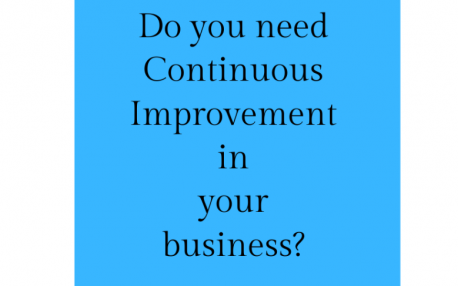Do I need CI?
Over the past few weeks, while networking and connecting with people through #laurens100lunches, I’ve had a few people ask me what a Continuous Improvement (CI) Consultant does. I found that I was giving the same answer and thought I would write about it. There are so many articles about what consultants and coaches do. Still, I didn’t find much content on precisely what I do.
My intent with this article is to provide a small insight into what I do with my clients. There are many CI Consultants, each of us gives brings a different flavor to our clients. What I’m sharing with you is what I do and how I approach things.
What is a CI Consultant?
My elevator speech is:
I specialize in helping business owners and leaders from mid-size organizations uncover and solve their business problems with Continuous Improvement.
While networking, I’m not particularly eager to use the terms business processes, Lean, Lean Six Sigma, or Six Sigma when meeting new people. I believe CI is so much more than that. CI is a toolbox of tools that help people and businesses succeed through the use of mindset, culture, and methodologies. It is not just about improving a business process, but it is about changing and growing. It encompasses the business leaders, owners, people in the business, front-line workers, customers or clients, culture, technology, and processes. Without all these elements, you cannot have a successful business.
So how do I help business leaders and owners?
I partner with my clients to guide them along the CI path:
- find the actual current state
- develop solutions
- create a Future State map, roadmap, and plan
- guide them along the CI path for the future state and change management
I’m also teaching and coaching my clients and their teams about CI and incorporating it into their business. It is about incorporating CI into their companies to continue to improve as things evolve.
My clients experience tremendous success. They usually experience and excel in business improvement. My approach is different from what you typically find with other consultants. I’m the type of consultant who partners with my clients and teams by using natural language and rolling up my sleeves. As Alan Weiss shares in his teachings, you don’t want a ski coach who sits in the lodge sipping brandy and talking ski theory. You want someone who grabs you and says, “Follow me down the hill.” I believe in partnering with you, your teams, and your employees at all levels to model the best solutions that fit your business problems.
Do I know if I need a CI consultant?
The other question I encounter is, “How do I know if I need CI or if I know someone that needs help?” It’s not always easy for a business leader or owner to identify if they need help. Using CI is not always about helping a failing process, product, or business. CI can help a company get to the next level, grow successfully, or adapt quickly to changes.
So how do you know if you or someone might need CI?
Business owners and leaders bring me in when they….
- are frustrated with
- Rising costs
- Dissatisfied customers
- Losing customers
- Paying penalties
- Unsatisfied employees
- feel challenged and pressured to find the right places to make the right changes with process improvements and implementing new technology
- aren’t prepared with the issues with expanding their business
- have process or technology improvements that are not working as planned, and employees cannot adapt to the changes.
- are pressured to raise prices due to higher costs, resulting in lower profit margins
- believe that to cut costs, they need to fire employees
- they are frustrated with overtime costs and low quality because they can’t keep up with demand
- realize they need a more individual approach to finding and solving real problems
The benefits of using a Continuous Improvement
Benefits can be broken up into hard benefits and soft benefits. Some of the hard benefits are:
- Increased Revenue
- Reduced costs
- Reduce the need for capital expenditure
- Reduce the need to hire additional employees
- Reduce overtime hours
- Improving cash flow
- Faster quote to cash
- Better profit margins
Soft benefits are:
- Improved culture and employee morale
- Improved effectiveness
- Customer focus – Looking at what the customer wants
- Leading by fact and alignment
- Eliminates guessing
- Measurements or KPIs that are customer focus and helps to define success.
Final thoughts
As things change faster than we expected, we need to continue finding new ways to do things. These changes we are encountering can be positive. CI can help take away some of the uncertainty and provide you with the structure and creativity needed to navigate anything that comes your way. It can help offer you a way to grow and become successful. You need to make sure that you are ready for the changes that come from the market, technology, customer behavior, and the environment. It is a forever-changing world, and CI can help you now and in the future.
What are your thoughts?
Have you experience any of these issues, or are there other issues?
Do you think Continuous Improvement can help you?
What other benefits can you think about?
If you want to learn more about how CI can help you, let’s set up a time to talk.

“CI can help take away some of the uncertainty and provide you with the structure and creativity needed to navigate anything that comes your way.” – Lauren Hisey
Leave a Reply